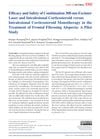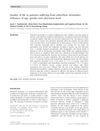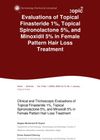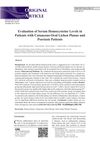 2 citations,
October 2023 in “Dermatology practical & conceptual”
2 citations,
October 2023 in “Dermatology practical & conceptual” More research is needed to understand hair and scalp disorders in people with skin of color.
 November 2023 in “Deleted Journal”
November 2023 in “Deleted Journal” Combining laser and corticosteroid is not better than corticosteroid alone for treating frontal fibrosing alopecia.
 December 2020 in “Galen Medical Journal”
December 2020 in “Galen Medical Journal” People with Alopecia Areata and Androgenic Alopecia have more mast cells in their scalp than healthy individuals, especially those with Alopecia Areata.
 29 citations,
January 2016 in “International Journal of Dermatology”
29 citations,
January 2016 in “International Journal of Dermatology” Longer hair loss leads to more severe CCCA; early treatment and avoiding damaging hairstyles help regrowth.
 September 2019 in “Journal of Investigative Dermatology”
September 2019 in “Journal of Investigative Dermatology” Severe Hidradenitis Suppurativa increases missed and unproductive workdays.
 21 citations,
January 2015 in “Dental research journal”
21 citations,
January 2015 in “Dental research journal” Women with PCOS may be more likely to have gum disease than healthy women.
 8 citations,
September 2018 in “Journal of Cosmetic Dermatology”
8 citations,
September 2018 in “Journal of Cosmetic Dermatology” Lower irisin levels in the blood may indicate more severe acne.
6 citations,
November 2020 in “Clinical Cosmetic and Investigational Dermatology” Both concentrations of triamcinolone acetonide are effective for hair regrowth in patchy alopecia areata, but 5 mg/mL is recommended to reduce side effects.
 79 citations,
September 2018 in “Dermatologic therapy”
79 citations,
September 2018 in “Dermatologic therapy” Oral tofacitinib can significantly improve recalcitrant lichen planopilaris.
 41 citations,
June 2010 in “Clinics in Dermatology”
41 citations,
June 2010 in “Clinics in Dermatology” Smoking harms skin health, causing slower wound healing, more wrinkles, and worsening some skin conditions, but may protect against certain others.
 5 citations,
December 2016 in “Journal of skin and stem cell”
5 citations,
December 2016 in “Journal of skin and stem cell” People with cutaneous Lichen Planus are more likely to have Metabolic Syndrome and related conditions like high cholesterol, diabetes, and high blood pressure.
 59 citations,
September 2008 in “Mycoses”
59 citations,
September 2008 in “Mycoses” Seborrheic dermatitis lowers quality of life more for women, younger people, and those with more education.
December 2021 in “Egyptian Journal of Dermatology and Venereology” Oxidative stress may worsen female pattern hair loss and could help track the disease and treatment.
 January 2024 in “Dermatology practical & conceptual”
January 2024 in “Dermatology practical & conceptual” Atopic dermatitis in kids with alopecia areata can predict poor response to topical immunotherapy.
 6 citations,
March 2020 in “Journal of International Medical Research”
6 citations,
March 2020 in “Journal of International Medical Research” Early hair loss common in Chinese males, linked to family history and smoking; early treatment advised.
February 2024 in “Biomedicines” Pregnant women with PCOS have higher levels of Neurokinin B in the placenta, especially with female babies.
 January 2025 in “Dermatology Practical & Conceptual”
January 2025 in “Dermatology Practical & Conceptual” Topical finasteride is as effective and safe as minoxidil for treating female pattern hair loss.
 25 citations,
December 2015 in “Journal of the European Academy of Dermatology and Venereology”
25 citations,
December 2015 in “Journal of the European Academy of Dermatology and Venereology” Alopecia areata significantly lowers quality of life, especially in personal and social areas, and more so if the patient is also depressed.
 7 citations,
July 2019 in “Clinics in Dermatology”
7 citations,
July 2019 in “Clinics in Dermatology” Hair loss can indicate or worsen with systemic diseases, and treating the underlying condition is important.
 April 2003 in “Journal of Cutaneous Medicine and Surgery”
April 2003 in “Journal of Cutaneous Medicine and Surgery” Some treatments work better for different types of hair loss, and nutrients like iron and L-lysine are important for preventing hair loss.
October 2022 in “International Journal of Research in Dermatology” Hormonal imbalances contribute to female hair loss, and trichoscopy is a useful diagnostic tool.
 December 2022 in “Dermatology and Therapy”
December 2022 in “Dermatology and Therapy” Alopecia areata needs more recognition and better treatment access in Latin America to improve patient care and outcomes.
 October 2022 in “Dermatology practical & conceptual”
October 2022 in “Dermatology practical & conceptual” People with hidradenitis suppurativa are more likely to have bipolar disorder than those with psoriasis or without skin conditions.
 August 2019 in “Journal of The American Academy of Dermatology”
August 2019 in “Journal of The American Academy of Dermatology” No link found between hair loss severity and PSA levels in men.
 December 2023 in “Intisari Sains Medis”
December 2023 in “Intisari Sains Medis” SLE and DM can coexist but are rare and need careful evaluation.
 2 citations,
April 2019 in “Acta medica Philippina/Acta Medica Philippina”
2 citations,
April 2019 in “Acta medica Philippina/Acta Medica Philippina” People with alopecia areata often have lower vitamin D levels than healthy people.
 128 citations,
February 2016 in “British Journal of Dermatology”
128 citations,
February 2016 in “British Journal of Dermatology” Alopecia areata significantly lowers the quality of life, especially in emotional and mental health aspects.
 3 citations,
September 2017 in “Galen medical journal”
3 citations,
September 2017 in “Galen medical journal” Patients with psoriasis and cutaneous-oral lichen planus have higher blood homocysteine levels than healthy people.
 February 2024 in “International journal of medical science and clinical research studies”
February 2024 in “International journal of medical science and clinical research studies” CCCA is a scarring hair disorder mainly affecting people of African descent, needing better awareness and treatment.
 October 2023 in “Clinical medicine and medical research”
October 2023 in “Clinical medicine and medical research” Thyroid function may influence hair loss after COVID-19.

























